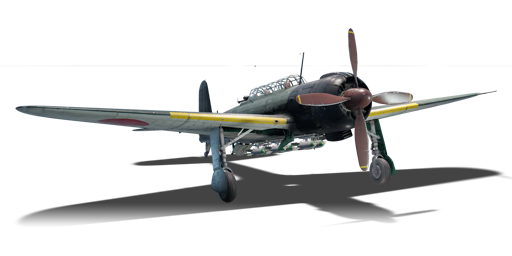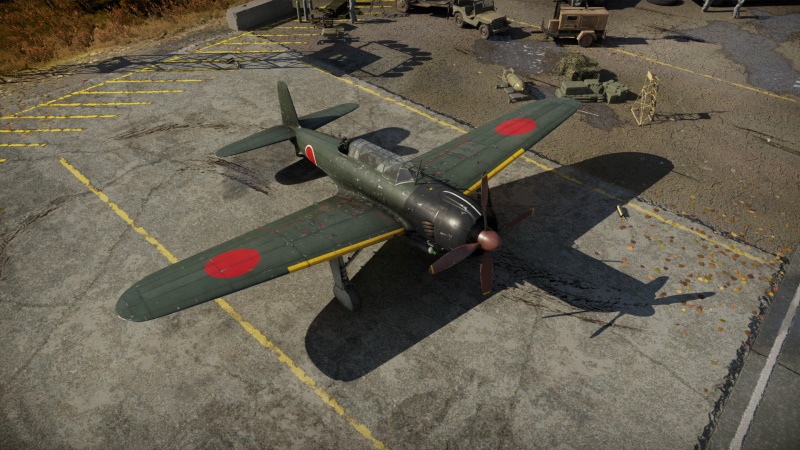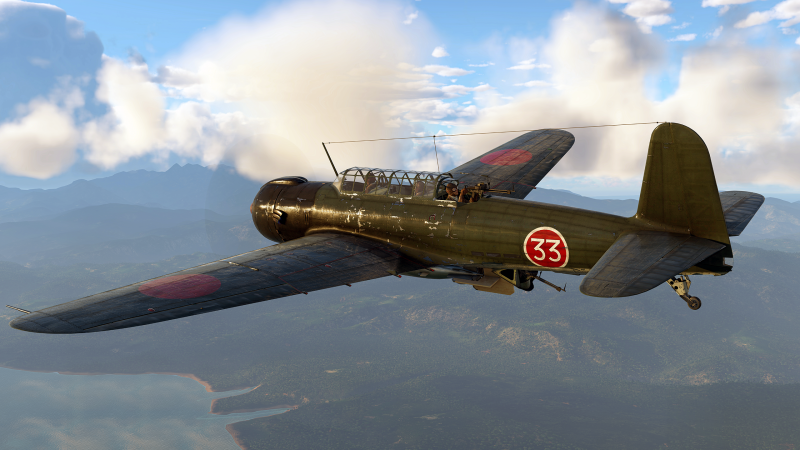B6N2 Model 12
| This page is about the Japanese bomber B6N2 Model 12. For other versions, see B6N (Family). |
Contents
Description
The B6N2 Model 12 (officially designated the "Tenzan" (Heavenly Mountain)) is a rank Japanese bomber with a battle rating of (AB), (RB), and (SB). It was introduced in Update "Starfighters".
The Tenzan 12 is a simple improvement over the Tenzan 11 by switching out Nakajima's failed engine with the Navy-demanded proven Mitsubishi Kasei 25 engine. This would become the main production variant of the B6N (Family).
General info
Flight performance
| Characteristics | Max Speed (km/h at 4,900 m) |
Max altitude (metres) |
Turn time (seconds) |
Rate of climb (metres/second) |
Take-off run (metres) | |||
|---|---|---|---|---|---|---|---|---|
| AB | RB | AB | RB | AB | RB | |||
| Stock | 454 | 441 | 21.6 | 22.3 | 7.9 | 7.9 | 270 | |
| Upgraded | 512 | 481 | 20.8 | 21.0 | 16.2 | 11.5 | ||
Details
| Features | ||||
|---|---|---|---|---|
| Combat flaps | Take-off flaps | Landing flaps | Air brakes | Arrestor gear |
| ✓ | ✓ | ✓ | X | ✓ |
| Limits | ||||||
|---|---|---|---|---|---|---|
| Wings (km/h) | Gear (km/h) | Flaps (km/h) | Max Static G | |||
| Combat | Take-off | Landing | + | - | ||
| 368 | 354 | 280 | ~11 | ~3 | ||
| Optimal velocities (km/h) | |||
|---|---|---|---|
| Ailerons | Rudder | Elevators | Radiator |
| < 300 | < 300 | < 310 | > 300 |
Survivability and armour
- No armour
- Non-self sealing fuel tanks (3 in each wing)
Modifications and economy
Armaments
Suspended armament
The B6N2 Model 12 can be outfitted with the following ordnance:
- 6 x 60 kg Navy Type 97 Number 6 bombs (360 kg total)
- 2 x 250 kg Navy Type Number 25 Model 2 bombs (500 kg total)
- 1 x 800 kg Number 80 Mod. 1 bomb (800 kg total)
- 1 x 835 kg Type 91 Model 2 torpedo
- 1 x 850 kg Type 91 Model 3 torpedo
The 800 kg bomb will destroy 1 base, it's a good pick for maps with few ground targets. The 250 kg bombs are great for destroying pillboxes and tanks, but you can only have two of them. Make sure to use a slight dive when bombing and use the bombsight for increased accuracy. The 6 x 60 kg bombs are a great option for this plane. Since they weigh so little, you can be super accurate with these bombs, just aim the crosshair where you want the bomb to drop, and pull up. No need for a bomb sight. Use these bombs for light targets such as AAA, vehicles, armoured cars, artillery, howitzers, machine guns, and bridges. The torpedoes are not really useful for this plane in air battles, as ships only spawn in pacific maps, and this plane is at too low of a BR to be put in a Pacific Theater battle.
Defensive armament
The B6N2 Model 12 is defended by:
- 1 x 7.7 mm Type 92 machine gun, dorsal turret (679 rpg)
- 1 x 7.7 mm Type 92 machine gun, ventral turret (679 rpg)
Usage in battles
This plane is great for bombing medium tanks, light pillboxes, howitzers, and vehicles. Since it is so fast, it can make multiple trips to the airfield if a resupply of bombs is needed.
For naval maps and naval gamemode it's best advised to bring the torpedo and hit ships in a quick, close, hit and run style torpedo run, the engine allows for high speeds and Japanese torpedoes are among the highest speed resistant torpedoes in-game at the cost of range of only 2 km. It is also a possibility of squading up with friends / other torpedo carrying planes to dispose of the enemy carriers / battleships in a multiple hit torpedo strike.
Manual Engine Control
| MEC elements | ||||||
|---|---|---|---|---|---|---|
| Mixer | Pitch | Radiator | Supercharger | Turbocharger | ||
| Oil | Water | Type | ||||
| Controllable | Controllable Not auto controlled |
Controllable Not auto controlled |
Controllable Not auto controlled |
Separate | Controllable 2 gears |
Not controllable |
Pros and cons
Pros:
- B6N for Carrier-based torpedo bomber
- Bomber spawn
- 1 x Type 91 Aerial Torpedo
- Torpedo has the highest drop speed in the game at 580 km/h and is one of the most feared torpedoes in Naval Battles
- 6 x Type 97 No.6 Land Bomb (60 kg)
- Gets a bomb rack of 6 x 60 kg bombs which can be used to hit multiple targets
- 1 x No.80 Land Bomb (800 kg)
- Heaviest bomb Japanese Navy can offer
- Common Navy plane construction:
- Excellent manoeuvrability
- B6N Specific:
- Great engine power, produces 1,550 hp
- High top speed for a torpedo bomber (481 km/h)
- Ventral gunner
- Model 12 Specific:
- Better performing engine compared to Model 11
- Higher top speed
- Higher altitude
- Better performing engine compared to Model 11
Cons:
- B6N for Carrier-based torpedo bomber
- No offensive armament
- No airbrakes
- Relatively Large target
- Common Navy plane construction:
- Poor defensive armament: 7.7 mm Type 92 MG
- Fragile, little armour, and no self-sealing fuel tanks
- Exposed tail gunner
- B6N Specific:
- Dead zones directly behind the aircraft, you are better off turn fighting and using your turrets while they struggle to complete the turn
History
An excellent replacement for the Nakajima B5N in the role of on-board torpedo aircraft, the B6N Tenzan entered service very late, after more than two years of testing. Named JILL in the Allied code, this large single-engine plane appeared as a prototype in spring 1941. The first tests revealed serious steering stability problems. Subsequently, there were difficulties in developing the engine and the need to reinforce the landing gear. After 133 units of the first version of the B6N1 were built, the second production model began to be delivered towards the end of 1943. A total of 1,268 units were built.
The B6N2 is the main production model of the B6N series thanks to a more readily available Mitsubishi Kansei engine, instead of a in-house Nakajima Mamori engine trialed on the B6N1.
The B6N2 has seen alot of use in the southern pacific land bases and few remaining carrier groups. Due to lack of experienced pilots and growing allied air power, the B6N couldn't accomplish the same / better feats the B5N has done in its prior years of the war and damage to the enemy fleet were low and overall performance was average.
Media
- Skins
See also
- Related Development
- B5N - (predecessor)
- B6N1 mod. 11 - (base model)
- B6N2 mod. 12 - (main production model)
- B6N2a mod. 12A - (revised tail armament)
- Similar aircraft of comparable role, configuration and era
External links
| Nakajima Aircraft Company (中島飛行機株式会社 ) | |
|---|---|
| Fighters | Ki-27 otsu · Ki-27 otsu Tachiarai |
| Ki-43-I · Ki-43-II · Ki-43-III otsu | |
| Ki-44-I · Ki-44-I 34 · Ki-44-II otsu · Ki-44-II hei | |
| Ki-84 ko · Ki-84 otsu · Ki-84 hei | |
| Ki-87 | |
| Hydroplanes | A6M2-N* |
| Interceptors | J1N1 · J5N1 |
| Bombers | B5N2 |
| B6N1 Model 11 · B6N2 Model 12 · B6N2a Model 12Ko | |
| G5N1 · G8N1 | |
| Ki-49-I · Ki-49-IIa · Ki-49-IIb · Ki-49-IIb/L | |
| Recon | E8N2 |
| Jet Fighters | Kikka |
| Captured | ␗Ki-27 otsu · ▃Ki-43-II · ␗Ki-43-III ko · ␗Ki-44-II hei · ␗Ki-84 ko |
| *Refit of the Mitsubishi A6M2 mod. 11 | |
| See also | Fuji Heavy Industries (1957-2017) |
| Japan bombers | |
|---|---|
| Navy | |
| Carrier-based attack bomber | |
| B5N | B5N2 |
| B6N | B6N1 · B6N2 · B6N2a |
| B7A | B7A2 · B7A2 (Homare 23) |
| Carrier-based dive bomber | |
| D3A | D3A1 |
| D4Y | D4Y1 · D4Y2 · D4Y3 Ko |
| Shipboard Observation seaplane | |
| F1M | F1M2 |
| Land-based Attack bomber | |
| G4M | G4M1 |
| G5N | G5N1 |
| G8N | G8N1 |
| Flying boat | |
| H6K | H6K4 |
| H8K | H8K2 · H8K3 |
| Land-based Bomber | |
| P1Y | P1Y1 |
| Army | |
| Light | Ki-32 |
| Ki-48-II otsu | |
| Heavy | Ki-21-Ia · Ki-21-I hei |
| Ki-49-I · Ki-49-IIa · Ki-49-IIb · Ki-49-IIb/L | |
| Ki-67-I Ko · Ki-67-I otsu | |
| Other countries | ▅B-17E |






